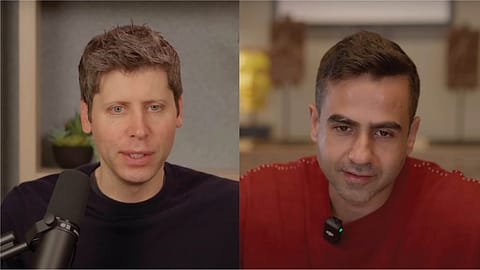Sam Altman on GPT-5, AI entrepreneurship, and why humanity still matters in an AI-first world
OpenAI’s CEO tells Nikhil Kamath why GPT-5 is a leap, not just an upgrade — and why adaptability, authenticity, and AI-native thinking will define the next generation of founders.

OpenAI CEO Sam Altman isn’t in the business of modest updates. GPT-5, he insists, isn’t just faster or smarter — it’s a qualitative leap. Speaking with Zerodha Co-founder Nikhil Kamath on the WTF Podcast, Altman described the new model as a turning point in how humans will work, create, and build businesses with artificial intelligence.
“The thing that has been most striking for me is both in big and small ways, going back from GPT-5 to our previous generation model is just so painful… it’s like having PhD-level experts in every field available to you 24/7, not only to ask anything but also to do anything for you.”
Unlike its predecessors, GPT-5 functions as an integrated system — capable of executing long, multi-step tasks without forcing users to hop between tools. “The robustness and reliability has greatly increased,” Altman said. “I’m very impressed by how long and complex a task it can carry out.”
AI as a co-founder
Asked what a 25-year-old entrepreneur could build on top of GPT-5, Altman was unequivocal: the barriers to starting a company have never been lower. “You could build an entire startup way more efficiently than you ever could before,” he said. “You could use GPT-5 to write the software for a product, handle customer support, write marketing and communications plans, review legal documents — things that would have taken a lot of people and a lot of expertise, and now GPT-5 can help you do all of it.”
But Altman cautioned that using AI isn’t, by itself, a moat. “Using AI itself does not create a defensible business,” he said. “You’ve always got to parlay that advantage into a durable business with real value that gets created. It’s kind of a race against the clock to do that.”
He compared the moment to the early App Store era — when simple apps like flashlights thrived briefly before Apple built those features into iOS. The companies that endured, like Uber, did so by solving deeper problems and forging lasting relationships with customers.
Recommended Stories
For individuals, his advice was simple: start experimenting. Altman uses GPT-5 himself to build small pieces of software for everyday problems, refining them through an interactive loop. “Rather than treating it as a one-shot tool, it’s an interactive process,” he said. “Start building, test it, adjust it, improve it. That’s how you get fluent.”
Adaptability and what Altman calls “AI-native thinking” will define this generation of founders and workers. “Learning how to use AI tools is probably the most important hard skill right now,” he said. “The difference between people who are really good at it and those who aren’t is huge.”
The human factor in an AI world
For all the power of GPT-5, Altman stressed that human authenticity still matters. “The models are going to be much smarter than we are, but people really care about other humans,” he said. “Being a real person in a world of unlimited AI content will increase in value.”
(INR CR)
He urged young founders to resist projecting false certainty: “No one has a plan. Everyone is figuring it out as they go. The best founders I’ve watched are quick learners who adapt to new data.” That ethos guides OpenAI itself. “The number of times we’ve thought we knew something only to get smacked in the face by reality has been a lot,” Altman admitted. “When that happens, we change what we’re going to do.”
Beyond screens and into the real world
Looking ahead, Altman predicted that AI companions will eventually move beyond phones and laptops into new “ambient” devices. “You want AI to have as much context as possible, to do stuff for you and be proactive,” he said. “Current form factors like computers and phones are either on or off—they’re not quite right for that sci-fi dream of an AI companion.”
He hinted at experiments with new hardware, including projects with legendary designer Jony Ive. Glasses, wearables, and tabletop devices could all play a role in bringing AI seamlessly into daily life.
Robotics is another frontier he’s excited about. “I think one of the things that is going to feel most AGI-like is seeing robots just walk by you on the street doing normal day-to-day tasks,” he said. While non-humanoid robots will have their place, Altman noted that “the world is built for humans… door handles, steering wheels, factories — a lot of this is designed for our own morphology.”
A personal note: Family in a post-AGI world
Beyond technology, Altman spoke about becoming a parent, calling it “the most important and meaningful thing I could imagine doing.” As AI transforms work and creativity, he hopes family and community regain prominence. “It’s pretty clear that family and community are two of the things that make us the happiest,” he said. “I hope we will turn back to that.”
Altman believes this era offers extraordinary opportunities — but also a reminder of what remains uniquely human. “This is probably the most exciting time ever to be starting your career,” he said. “The canvas is open, and the only limit is the quality and creativity of your ideas.”